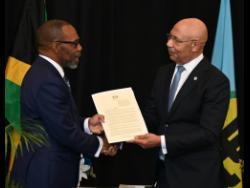By Janet Silvera
WESTERN BUREAU:
Fifteen years ago, Winston Anderson stood at King’s House in Kingston, Jamaica, being sworn in as a judge of the Caribbean Court of Justice (CCJ).
On Sunday, in a powerful, full-circle moment, he returned to the spotlight, this time as the court’s fourth president, assuming leadership on the cusp of the 49th Meeting of CARICOM Heads of Government in Montego Bay, St James.
However, even amid the ceremonial grandeur, Anderson’s eyes were set firmly on the future: the region’s youth.
“There is a Caribbean dream, if we dare to conceive it and to pursue it,” he told a ballroom of dignitaries, government officials, and legal minds. “Our most brilliant young citizens need not look beyond our shores for opportunity to excel in nation-building or in living a good life.”
Raised in the quiet rural district of St Ann, Jamaica, Anderson recalled a childhood shaped not by privilege, but by values.
“Discipline, hard work, integrity, respect, and perseverance, these were taught by example,” he said, crediting his community for lighting the mileposts of his life.
His journey, from a student at UWI’s Mona and Cave Hill campuses to a lecturer and general counsel of CARICOM, is one he shares proudly with many across the region. “Graduates of the Faculty of Law and any of our three law schools are among the brightest legal minds anywhere in the world,” he said. “Their presence in our communities is proof that excellence is homegrown.”
He called for regional leaders to continue investing in those minds, and challenged the countries that have not yet adopted the CCJ’s appellate jurisdiction, among them his own native Jamaica, to “lay full claim to our judicial sovereignty”.
“I’m looking straight ahead as I say this,” he remarked pointedly, in a line many interpreted as been directed at Prime Minister Dr Andrew Holness, who was seated just metres away.
Anderson made it clear that the CCJ was not a borrowed institution, but a Caribbean creation.
“It was not imposed on us by anyone,” he said. “Rather, it was conceived and established by the people of the Caribbean to serve Caribbean interests.”
In its 20 years, the CCJ has delivered hundreds of judgments shaping how Caribbean people live, do business, and resolve conflict. However, Anderson believes its greatest impact is still ahead, particularly if the region’s young legal minds are empowered to help steer that future.
“I intend to lead the court in a way worthy of its origins and its calling,” he said, pledging to intensify itinerant sittings so the public can see their court in action and feel connected to it. “We are, in fact, their kith and kin.”
Closing his remarks with emotion, he thanked his three children; all professionals trained in the region’s education system and paid tribute to the staff and judges of the CCJ. “Without their love and support, this journey would not have been possible,” he said.
As the Caribbean moves deeper into a new era of self-determination, Anderson’s presidency begins not just with an oath, but also with a vision. A vision where Caribbean youth stay, rise, and lead from within the region.
janet.silvera@gleanerjm.com
